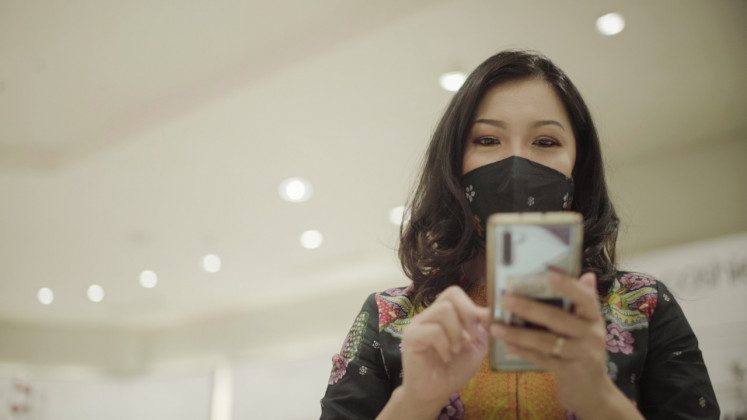
The acceleration of digitalization in Indonesia amid the COVID-19 pandemic can be felt by all members of society, including local entrepreneurs. Despite the challenges brought by the crisis, many micro, small and medium enterprises (MSME) have bounced back from the pandemic’s impacts through the use of digital platforms.
One of them is Batik Nayara, founded by Andrina in 2011. Thanks to her persistence in attending various bazaars and exhibitions, a big Indonesian department store brand asked her to open a booth in its outlets.
Currently, the brand sells batik in Jakarta, Makassar in South Sulawesi, as well as Bandung in West Java.
Like many other brands around the world, Batik Nayara was significantly impacted by the COVID-19 pandemic when it first hit Indonesia. However, during the initial months of the pandemic, Andrina decided to offer a different product line that was more relevant to the ongoing health crisis.
Her business started producing personal protective gear like face masks and uniforms for medical workers, so that she could retain her employees and still earn a living.
At the time, Batik Nayara only provided two bank options for bank transfers. This limited option discouraged some customers who sought alternative payments to complete their transactions.
Andrina also found difficulties reconciling those transactions. Even though she has a customer service staff and a finance team to double check the payments, this process consumes most of their time and relies on her daily supervision.
Struggling to adapt to online channels, particularly for her payment reconciliation process, Andrina stumbled upon Midtrans, an online payment gateway system under on-demand application Gojek’s ecosystem. She found that the payment gateway helped her business run without hassle, and started to rely on Midtrans to fulfill her customers’ needs and help her team work more efficiently.
The acceleration of digitalization in Indonesia amid the COVID-19 pandemic can be felt by all members of society, including local entrepreneurs. Despite the challenges brought by the crisis, many micro, small and medium enterprises (MSME) have bounced back from the pandemic’s impacts through the use of digital platforms.
One of them is Batik Nayara, founded by Andrina in 2011. Thanks to her persistence in attending various bazaars and exhibitions, a big Indonesian department store brand asked her to open a booth in its outlets.
Currently, the brand sells batik in Jakarta, Makassar in South Sulawesi, as well as Bandung in West Java.
Like many other brands around the world, Batik Nayara was significantly impacted by the COVID-19 pandemic when it first hit Indonesia. However, during the initial months of the pandemic, Andrina decided to offer a different product line that was more relevant to the ongoing health crisis.
Her business started producing personal protective gear like face masks and uniforms for medical workers, so that she could retain her employees and still earn a living.
At the time, Batik Nayara only provided two bank options for bank transfers. This limited option discouraged some customers who sought alternative payments to complete their transactions.
Andrina also found difficulties reconciling those transactions. Even though she has a customer service staff and a finance team to double check the payments, this process consumes most of their time and relies on her daily supervision.
Struggling to adapt to online channels, particularly for her payment reconciliation process, Andrina stumbled upon Midtrans, an online payment gateway system under on-demand application Gojek’s ecosystem. She found that the payment gateway helped her business run without hassle, and started to rely on Midtrans to fulfill her customers’ needs and help her team work more efficiently.
The acceleration of digitalization in Indonesia amid the COVID-19 pandemic can be felt by all members of society, including local entrepreneurs. Despite the challenges brought by the crisis, many micro, small and medium enterprises (MSME) have bounced back from the pandemic’s impacts through the use of digital platforms.
One of them is Batik Nayara, founded by Andrina in 2011. Thanks to her persistence in attending various bazaars and exhibitions, a big Indonesian department store brand asked her to open a booth in its outlets.
Currently, the brand sells batik in Jakarta, Makassar in South Sulawesi, as well as Bandung in West Java.
Like many other brands around the world, Batik Nayara was significantly impacted by the COVID-19 pandemic when it first hit Indonesia. However, during the initial months of the pandemic, Andrina decided to offer a different product line that was more relevant to the ongoing health crisis.
Her business started producing personal protective gear like face masks and uniforms for medical workers, so that she could retain her employees and still earn a living.
At the time, Batik Nayara only provided two bank options for bank transfers. This limited option discouraged some customers who sought alternative payments to complete their transactions.
Andrina also found difficulties reconciling those transactions. Even though she has a customer service staff and a finance team to double check the payments, this process consumes most of their time and relies on her daily supervision.
Struggling to adapt to online channels, particularly for her payment reconciliation process, Andrina stumbled upon Midtrans, an online payment gateway system under on-demand application Gojek’s ecosystem. She found that the payment gateway helped her business run without hassle, and started to rely on Midtrans to fulfill her customers’ needs and help her team work more efficiently.
The acceleration of digitalization in Indonesia amid the COVID-19 pandemic can be felt by all members of society, including local entrepreneurs. Despite the challenges brought by the crisis, many micro, small and medium enterprises (MSME) have bounced back from the pandemic’s impacts through the use of digital platforms.
One of them is Batik Nayara, founded by Andrina in 2011. Thanks to her persistence in attending various bazaars and exhibitions, a big Indonesian department store brand asked her to open a booth in its outlets.
Currently, the brand sells batik in Jakarta, Makassar in South Sulawesi, as well as Bandung in West Java.
Like many other brands around the world, Batik Nayara was significantly impacted by the COVID-19 pandemic when it first hit Indonesia. However, during the initial months of the pandemic, Andrina decided to offer a different product line that was more relevant to the ongoing health crisis.
Her business started producing personal protective gear like face masks and uniforms for medical workers, so that she could retain her employees and still earn a living.
At the time, Batik Nayara only provided two bank options for bank transfers. This limited option discouraged some customers who sought alternative payments to complete their transactions.
Andrina also found difficulties reconciling those transactions. Even though she has a customer service staff and a finance team to double check the payments, this process consumes most of their time and relies on her daily supervision.
Struggling to adapt to online channels, particularly for her payment reconciliation process, Andrina stumbled upon Midtrans, an online payment gateway system under on-demand application Gojek’s ecosystem. She found that the payment gateway helped her business run without hassle, and started to rely on Midtrans to fulfill her customers’ needs and help her team work more efficiently.

“We can’t keep pushing the customer away just because they don’t have other payment options. We need to find immediate solutions to keep customers satisfied while maintaining our cash flow. A payment gateway could be the best choice to help us adapt to the online sales system,” Andrina explained.
According to Andrina, more diverse payment options lead to a more diverse consumer base.
Through Midtrans, the brand has been able to cater to its customers, who mostly come from the middle-upper socioeconomic bracket and prefer to use credit cards (50 percent) and GoPay (15 to 20 percent). Thanks to all these innovative strategies combined, Batik Nayara has been able to grow its revenue 15-fold from the early days of the pandemic.
“It is essential for business players to quickly [adopt] online business strategies using digital platforms to [survive] the current situation. After we let go of our inefficient manual payment system thanks to Midtrans, we had more time to brainstorm and prepare more innovative ideas,” Andrina said.
Andrina shared her experience with Midtrans during a virtual conference held by Gojek on Feb. 9. Titled, Moving Forward With Gojek: 2020 Flashback and New 2021 Business Trends, the webinar was also attended by Gojek merchant platform business head Novi Tandjung.
“The COVID-19 pandemic has awakened local MSMEs’ awareness on the importance of operating their businesses on digital platforms. For instance, in 2020, about 3,000 MSMEs registered to become Gojek merchant partners,” said Novi.
Encouraged by this positive trend, Gojek has also been working harder than ever to come up with innovations that can further accelerate MSMEs’ digital transformation efforts, according to Novi.
“Not only that, we’ll also work harder to come up with innovations that address the needs of our consumers and business partners. Needless to say, we will still face lots of pandemic-related challenges in this new year. Yet armed with our experience, lessons learned and an optimism to grow, I am confident that all of us will be resilient this year,” she said.
Gojek recently released its 2020 business trends and 2021 trend forecasts, which found that home businesses were the most popular trend for the culinary industry in 2020.
According to Gojek data, social media marketing appears to be the greatest survival strategy amid COVID-19, as 42 percent of all businesses increased their social media marketing throughout 2020.
Meanwhile, regarding consumers’ favorite promotional offers in 2020, 53 percent of customers clamored for discounts, while 30 percent liked delivery-fee deals and the remaining were very happy about total transaction discounts.
Finally, regarding the biggest-trending payment method via Midtrans for 2020, bank transfers came out on top, while installments without a card came second, QR codes came third and GoPay came fourth.
Through a set of initiatives, Gojek equips its merchants with end-to-end technology solutions — from payments and marketing to operations management — for them to thrive online. Payment solutions from Midtrans and GoPay have helped MSMEs like Batik Nayara maintain their cash flow to keep their businesses running during the pandemic.
Furthermore, Gojek also provides non-technology support such as community activities, insights on what is useful for business and training to improve MSMEs’ competencies so their businesses can adapt during the challenging time.